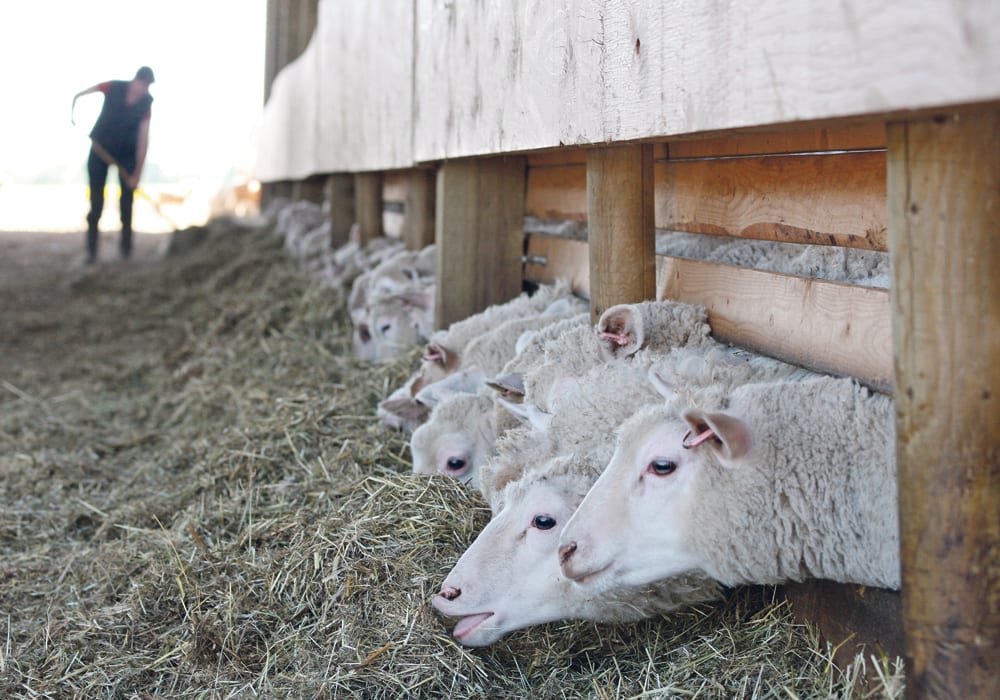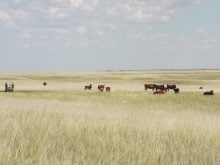The North American Lamb Co. says producers who supply it with animals will have to meet strict quality standards
LEDUC, Alta. — Prairie lamb producers may soon find themselves at a crossroads, thanks to an industry shakeup by a dominant new player in the market.
Farmers have been wrestling with the idea of change ever since the North American Lamb Co. entered the picture. It has offered them an opportunity that comes with both risks and rewards.
“It’s scary because what the company is doing is something new,” Kelly Cooper, a sheep farmer from Fusilier, Sask., said following a November producer meeting in Leduc about the expansion plans.
Read Also

Saskatchewan dairy farm breeds international champion
A Saskatchewan bred cow made history at the 2025 World Dairy Expo in Madison, Wisconsin, when she was named grand champion in the five-year-old Holstein class.
“Until we all feel it out and see it’s not going to hurt us, we’re going to be cautious and standoffish.”
The company, which is the result of a merger between SunGold Speciality Meats and Fresh Canada Meats, will bolster lamb production. Animals will come from a breeding flock of roughly 35,000 ewes in Manitoba and later be finished and processed in Alberta.
There are plans to expand the breeding flock to 50,000, with roughly 20,000 head located in Alberta.
During the meeting, president Gary Alexander told producers they can be part of the company’s plans but said that much of what is being produced now doesn’t meet its standards. Therefore, lamb suppliers will have to change.
“I’ve seen lambs that have more mud than meat on them,” he said.
“We can’t continue on like that.”
He said all animals coming into the facility will need to be consistent in size, age, quality and marbling. He also wants lambs year round, something that is challenging and costly to do.
As well, there won’t be premiums for quality, only penalties, he added. Pay will be based on the carcass rather than on live animal specifications.
“Right now, we don’t provide the market much. We don’t have enough product to satisfy their needs,” Alexander said.
While what he’s offering is a big opportunity, it’s also a gamble. Potential profits, costs of expansion and the company’s grading system will all have to be taken into account.
Some producers fear that if they don’t change, their businesses could take a hit because they might not meet the company’s demands.
They also fear the company could strong-arm farmers into meeting constantly changing quality specifications.
“I’m not saying they are going to do that, but if they change what they want, and we can’t meet those changes immediately, producers are going to be penalized,” said Lorri Lyster, a sheep breeder.
“It basically gives buyers all the power.”
Others, however, see opportunity. If they change and meet requirements, they could reap the rewards of a growing market.
“We do have to change,” farmer Tamara Bidwell said during the meeting.
“I was at the grocery store and there was no lamb on the shelves, but I saw chicken and pork. I would love to turn into the pork and chicken industry.”
Whether they want to change or not, Alexander said the company will carry on just fine without them.
“I’m here to tell people what we’re about. We’re here to build the market,” he said in a later interview.
“There are no conspiracy theories. We’re not trying to destroy anybody. We are just doing business.”
Lyster said she hopes the company’s move doesn’t cause producers to shy away from good breeds. The company might potentially offer genetics to producer partners, but that isn’t set in stone.
“I’m not saying my business is going to dry up, but I don’t want someone coming here and telling us we’re not raising the right breeds because they aren’t consistent,” she said.
“Some breeds just work really well for people, and I’m not going to raise something that works for (the company) but doesn’t work for me.”
The company’s impact on the industry won’t fully be known until it’s been running for some time.
“The proof will be in the pudding,” Lyster said.
“When someone shows up with a trailer load of 30 to 40 market lambs, I hope they get what they were promised to get.”
















